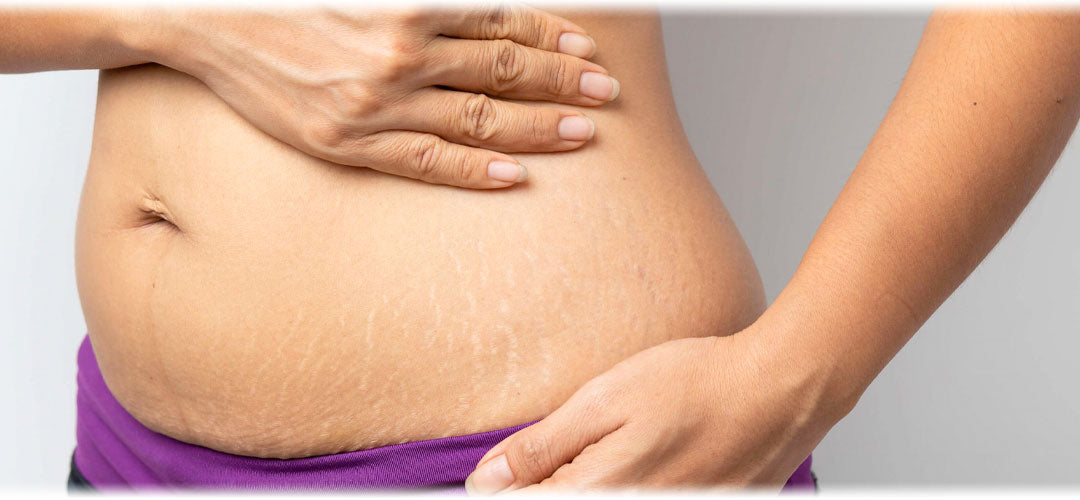
Whether you’re a first-time mum or already have children, falling pregnant is a wonderful, joyous experience.
Welcoming a baby into the world will change your life in so many ways. Your body will change as your pregnancy progresses, to give baby the nutrition it needs to develop naturally and prepare you for the birth. And with someone else to focus on rather than yourself, there may be many habits you have to break or routines you need to change to give your little one the best start in life.
• This includes how you take care of your skin.
As baby develops, your body will start to undergo physical and hormonal changes that can greatly impact your skin. Your body will start to produce more hormones, including oestrogen and progesterone, which will cause several noticeable physical changes. Stretch marks, hyperpigmentation (leading to dark patches of skin) and dry, itchy skin are common skin conditions among pregnant women. Increased hormonal activity may lead to more spots or pimples, and you may also notice changes to your hair and nails. And if you suffer from pre-existing skin conditions such as dermatitis, eczema or psoriasis, their symptoms may worsen during pregnancy.
All of this is perfectly normal, so there’s no need to worry.
Chances are if you are pregnant, you are watching what you eat and drink, have cut your caffeine and alcohol consumption and have stopped smoking. However, it’s essential to pay close attention to your regular skincare products and routine too. While most over the counter health and beauty products are perfectly safe to use, there are some things to avoid for both mother and baby. Certain ingredients can be absorbed into your body and, in turn, your baby’s body, which could be harmful to your little one.
So, if you are looking to switch up your skincare routine to keep your skin healthy during pregnancy, here are a few things to bear in mind.

• The importance of skincare during pregnancy
Looking after your skin while pregnant is vital. Your body will undergo several changes – some subtle, some noticeable – as your baby grows. Increased hormonal activity can lead to the appearance of more spots than usual, or patches of dry, red or itchy skin. You may also notice darker or discoloured patches of skin start to appear. And the bigger your baby gets, the more room it will need inside your womb. This can lead to the appearance of stretch marks. If you don’t treat these issues during pregnancy, they can be more challenging to sort out after baby has arrived. And even when your baby is born, it doesn’t end. Post-baby hormones can continue to cause skin problems or exacerbate the symptoms of existing skin conditions. It’s also worth remembering, especially if you are breastfeeding, that anything your body absorbs can be passed on to your baby. So, using natural, organic skincare products is the way to go.
Cocoa butter, for example, is a safe way of combating stretch marks and helping to fade skin blemishes. Ensuring you get plenty of Vitamin B, in the form of Folic Acid, can help reduce the effects of hyperpigmentation and ensure your skin returns to its normal colour after you’ve given birth. And keeping your skin clean and hydrated, using a gentle, natural cleanser and moisturiser, will help combat spots and dry or itchy skin.
• How to keep skin health during pregnancy
As we said earlier, switching to natural, organic skincare products manufactured to high ethical standards is the best way to ensure that your body is not absorbing anything that could harm you or your baby. If you are sticking with your regular skincare products, it’s worth scanning the ingredients to ensure they don’t contain anything harmful. Ingredients to avoid include high doses of retinoids including Tretinoin or Isotretinoin, Salicylic Acid or Hydroquinone.
On the other hand, skincare products, including vitamins C, E, K and B3, and green tea, are all high in natural antioxidants, which can boost your immune system, ward off free radicals in your body and safely enhance your skin’s natural vitality. As with all things, you should always check the label and speak with your doctor or pharmacist if you are unsure. More generally, here are a few top tips to keep your skin healthy during pregnancy:
Cleansing
Moisturising
Oily skin
Make-up
• How to prevent stretch marks
Stretch marks can affect anybody, but they are extremely common during pregnancy as the skin covering your tummy muscles stretches to accommodate your growing baby. While there is no way of preventing them entirely, there are some things you can do to reduce the risk of developing stretch marks and improve their appearance. Watching your weight during pregnancy is essential. While you will need to consume additional calories to ensure your baby develops correctly, not going above your recommended pregnancy weight will help keep stretch marks at bay. Keeping the skin around your stomach hydrated is also essential. That means both drinking lots of water and using a natural moisturiser to help it maintain its elasticity. And watching what you eat, by eating foods that boost skin health, can also help. Ensure your diet includes foods rich in Vitamin C, Vitamin D, Vitamin E, Zinc and protein. Eggs, lean meats, whole grains and fresh fruit and veg are the way to go – they are also good for baby too.
Check out these links to our products and collections to find out more:
Disclaimer:
Information and other content provided in Lily & Loaf blogs should not be construed as medical advice and should not be considered a substitute for professional medical expertise. If you have any medical concerns, you should consult with your health care provider.






